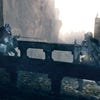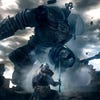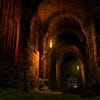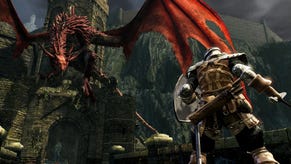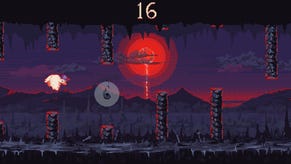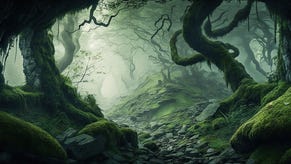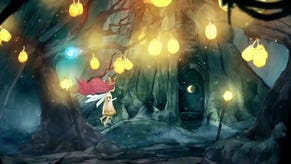Dark Souls
Tough love.
Few games, if any, have done medieval combat better. Hefty weapon swings clang off shields, shatter furniture and glance off stonework; combatants circle each other cautiously, waiting for an opening. The weight of your equipment set dictates how well your character can move and is so well communicated through animation and sound that you can feel the pounds of armour in the pad. Each weapon has a distinct attack pattern and rhythm.
The powerful parry-and-counter, a little too easy to pull off in Demon's Souls, is rather too difficult here, but otherwise this remains one of the most finely balanced action-RPG combat systems ever devised. Levelling up your character has a tangible effect but success always comes down to raw skill and careful observation.
You might not feel so warmly towards it to begin with. As soon as you leave the tutorial area, enemies hit hard. Combine this with a stringent new health system, some mean enemy placement and a positively brutal first 'proper' boss and the first few hours of Dark Souls represent a vindictive difficulty spike which many will never surmount.
You'll be cursing the loss of the herbs you could collect and consume to regain health in Demon's Souls - but in fact, this is one of the best changes to the design. You now refill an 'Estus' flask at bonfires which gives you a set number of health top-ups per life, and its effect is to improve the focus and balance of the entire game. Bonfires also top up your health and magic, but beware: each time you rest at one, every monster you've killed - excepting bosses and mini-bosses - will come back to life.
Finding a bonfire is a deep joy, as these are also where you resurrect after death, where you level up and where - if you possess a precious but rather arbitrarily awarded attribute called 'humanity' (described, with queer intensity, as "black sprites within your bosom") - you can 'unhollow'. Once human, you can 'kindle' the bonfire to provide vital extra health refills. There are other benefits to possessing and spending humanity points (which are dropped when you die, like souls), but the whole humanity system is opaque and illogical, despite seeming to be central to the game.
Dark Souls has a stubborn unwillingness to explain itself that, when it comes to discovering the game's many secret techniques and subtleties, is a great part of its appeal. However, humanity is one of a few occasions when its deep inscrutability counts against it. Another concerns the game's remarkable online features.
From's unique and brilliant vision, first presented in Demon's Souls, is of a game that is at once a solo adventure and a persistent online world; your game is yours and yours alone, but others' exist in parallel dimensions beside it. Players can glimpse each other as spectral apparitions flickering in and out of the light of bonfires, or suffering some former recorded death. They can write messages on the ground - helpful hints or grim jokes - to guide each other through the adventure, reflecting the way the community shares the arcane strategies required to beat the game on wikis and message boards.
You can invade other players' games and even kill them; alternatively, you can allow yourself to be summoned as a friendly phantom, offering some much-needed help and companionship amid all this desolate hostility. But the conditions for this are strict and unfathomable and - crucially - there's no option to join a particular friend.
From would argue that allowing too much control or communication within this weirdly remote system would damage the game's forbidding, lonely atmosphere. Maybe so, but it also denies us the enormous pleasure or facing these demons with a friend by our side. For me, that's one stern restriction too many.




